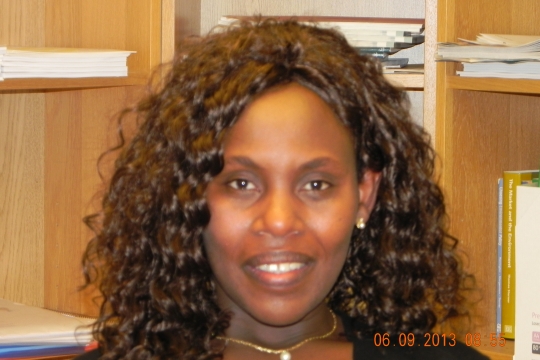Press release from Gothenburg University, School of Business, Economics and Law. 2013-09-06
Unsafe water in Rwanda: An Empirical Analysis
Despite efforts made by the Rwandan government the availability of safe drinking water is far from covering the needs of the population. Only 3.4% have access to tap water within their homes and 32% to any piped network. The majority relies on available non-tap sources and the poor are the most affected, which is shown in a new thesis from the Environmental Economics Unit at School of Business, Economics and Law at Gothenburg University.
- Most poor people have no other option than consuming unsafe water. They generally have to walk long distances and carry heavy pots filled with water which quality exposes them to diseases and parasites, says Claudine Uwera who in her thesis has put a lot of effort into revealing the necessities of an improved tap water infrastructure in Rwanda.
In five articles and through various methods, such as household surveys, choice experiments and a traditional public good experiment, she points out the weaknesses of the current system.
Uwera shows that even households connected to a piped network suffer from bad water quality and systems that only operate sporadically. Improved water quality and provision lays in the interest of the entire population but still little effort has been done. The main problem in Rwanda, just as in many developing countries, is the absence of a well-functioning price structure which covers costs and motivates investments to infrastructure. Although full-cost-recovery pricing of all water could easily exclude the poorest. Therefore subsidies are common and necessary but at the same time they often undermine the water sector.
Uwera concludes that it is important that improvements are aimed at facilitating the situation for the poor at the same time as all proposals must guarantee an improvement, or at least not worsen the conditions, for households who are now in a favorable situation.
When water is scarce there is often competition for it, not only among people but also between different sectors. Agriculture is believed to stand for more than 80% of total water withdrawals in developing countries. Improved water quality and irrigation could hence spur agricultural productivity and alleviate hunger.
Uwera shows that poor households cannot expect to be connected to the piped network in the short run, not even in urban areas. Improving the non-tap distribution systems could therefore be considered a good temporal solution. In rural areas the current situation is even worse and the lack of a financial mechanism even more obvious.
Uwera’s thesis has also received notice in Swedish radio:
(after min 4:18 in ”Måndag 9 september 2013 kl 06:34”) http://sverigesradio.se/sida/avsnitt?programid=4001 and http://sverigesradio.se/sida/artikel.aspx?programid=406&artikel=5640004
The thesis is sponsored by: Sida-National University of Rwanda capacity-building programme
Time and place: Friday 10.15 am. September 6, 2013 at School of Business, Economics and Law room E44
Thesis title: Water Demand and Financing in Rwanda: An Empirical Analysis
For information contact: Claudine Uwera 031 786 2635 claudine.uwera@economics.gu.se
Supervisor: Jesper Stage Jesper.Stage@economics.gu.se
By: Karl Sterner
